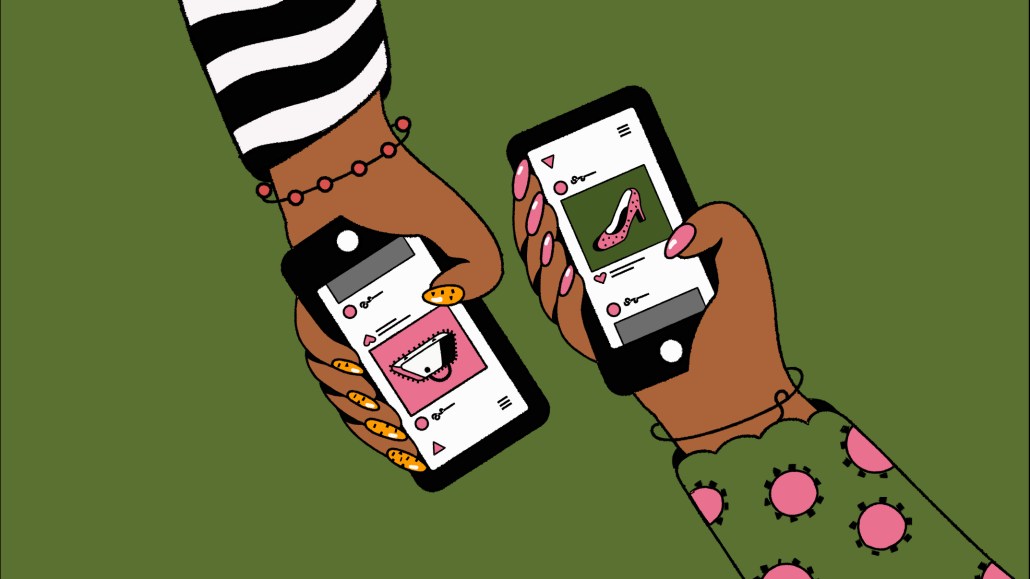Secure your place at the Digiday Media Buying Summit in Nashville, March 2-4
Dentsu’s podcast celebrating Black empowerment tries to do its part to fill the advertising inequity gap

It seems somehow fitting that a podcast celebrating Black empowerment that’s entering its third season would kick that season off at the outset of Black History Month. And it’s certainly a bit unusual that it was created by an agency holding company, in this case Dentsu.
More Than That with Gia Peppers kicked off season three last week, backed by several major advertisers (and Dentsu clients) including Procter & Gamble, General Motors, Kroger and Mastercard. Produced by Urban One and receiving significant radio distribution from American Urban Radio Network, the show claims to have generated $8 million in investment into Black-owned media.
Reaching Black-owned stations in 104 markets in the country through its radio distribution, More Than That’s topics delve into issues that affect the Black experience in the United States — but the business goal is ultimately to rectify some of the inequities of the advertising supply chain. Season three’s first episode revolves around education and historically Black colleges and universities. Past guests include Baratunde Thurston and Jemele Hill, and future guests will include DJ Envy and more male guests to balance out what’s been a female-heavy guest list of the last two years.
Peppers said the show first came to life amidst the social upheaval of the Covid pandemic and George Floyd’s murder, with an aim to give voice to “the pain that our community was feeling and real conversations we were having about how to balance being in the midst of so many pandemics — a viral pandemic, a racial pandemic and a societal pandemic.”
“We want this to be to a certain extent like a franchise, where we’re continuing on with new seasons, and building more content, and really giving information that is critical to African Americans,” said Mark Prince, senior vp and head of economic empowerment with Dentsu Media. “Having some great blue chip advertisers that can tailor their episodes to topics that are important to them, or things that they’re trying to amplify as well, has made a big difference” for the program.
Prince explained the sponsors find ways to fit appropriately into each episode’s topic. For example, Kroger would serve as a sponsor for an episode about healthier eating. “We are very purposeful in terms of which episodes that our brands want to go into,” he said.
The program is said to have delivered over 750 million impressions over its first two seasons, and it’s received ad-industry trade awards as well as a Microsoft social impact award. Prince pointed to brand lift studies Dentsu has done which show More Than That sponsors are outperforming the average radio ad by 95 percent, as well as lift in brand consideration and differentiation. “It’s important that we look at different tools in terms of what defines the KPIs or the metrics for success,” said Prince.
Peppers herself, who serves as an executive producer of the podcast, also hosts other programs including VH1’s Black Girl Beauty and BET’s Black Coffee. She’s got both journalism and agency experience, having worked at KBS for a year on its BMW client at the time.
“I hope that this shows other major brands and major ad agencies that investing in the Black community and Black content and partnering with us on a major scale is a successful thing to do,” said Peppers. “We on the editorial side … do our job to make sure that the conversations that we really want to have work with some of the brands that are interested. Because it has to be a natural alignment with the storytelling.”
Meanwhile, Dentsu isn’t the only holding company taking steps to promote Black- and diverse-owned businesses. IPG’s Magna unit on Wednesday is wrapping the live portion of the third year of its Equity Upfront, a three-day event that seeks to grow investments in diverse-owned media companies. (Thursday’s content is virtual.)
Over the first year of the effort, Magna saw a 61 percent increase in participation from Black-owned media partners, noted Magna president Dani Benowitz in her opening comments on Tuesday.
And one participant expressed appreciation for Magna’s effort. “It gives changemakers in the industry the opportunity to align on how we accelerate progress for diverse media,” said Cavel Khan, chief commerce officer with media collective Group Black. “Investing in Black owned media is not only good for society, it’s good for business. By adding Black owned companies to every media plan, brands can take actionable next steps towards ensuring the dollars promised to diverse media are not just spoken about, they’re deployed.”
More in Media

From feeds to streets: How mega influencer Haley Baylee is diversifying beyond platform algorithms
Kalil is partnering with LinkNYC to take her social media content into the real world and the streets of NYC.

‘A brand trip’: How the creator economy showed up at this year’s Super Bowl
Super Bowl 2026 had more on-the-ground brand activations and creator participation than ever, showcasing how it’s become a massive IRL moment for the creator economy.

Media Briefing: Turning scraped content into paid assets — Amazon and Microsoft build AI marketplaces
Amazon plans an AI content marketplace to join Microsoft’s efforts and pay publishers — but it relies on AI com stop scraping for free.







